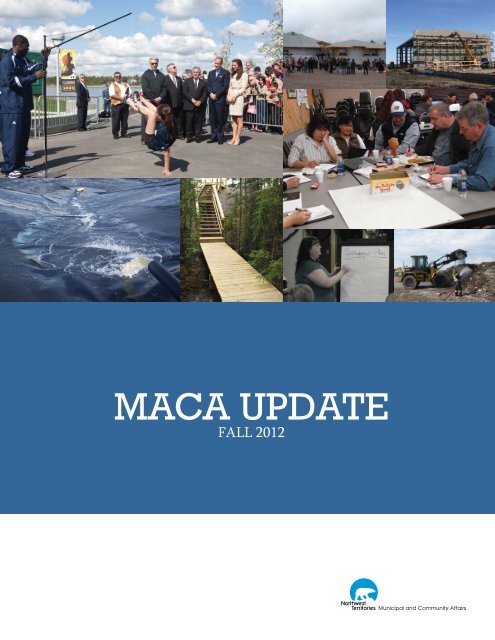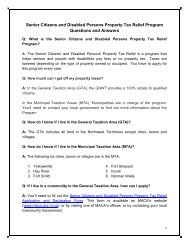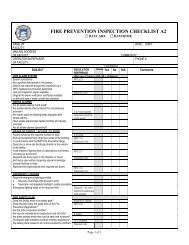MACA Update 2012 - Department of Municipal and Community ...
MACA Update 2012 - Department of Municipal and Community ...
MACA Update 2012 - Department of Municipal and Community ...
Create successful ePaper yourself
Turn your PDF publications into a flip-book with our unique Google optimized e-Paper software.
Gas Tax Agreement Funding (1)<strong>Community</strong>ActualProposed<strong>2012</strong>-20132013-2014Aklavik 294,268 294,268Behchoko 617,469 617,469Colville Lake 182,522 182,522Deline 268,375 268,375Dettah 205,461 205,461Enterprise 170,030 170,030Fort Good Hope 271,555 271,555Fort Liard 277,688 277,688Fort McPherson 336,286 336,286Fort Providence 317,208 317,208Fort Resolution 258,836 258,836Fort Simpson 425,320 425,320Fort Smith 704,004 704,004Gameti 212,048 212,048Hay River 1,015,622 1,015,622Hay River Reserve 218,635 218,635Inuvik 964,973 964,973Jean Marie River 163,443 163,443Kakisa 157,992 157,992Lutselk'e 224,767 224,767Nahanni Butte 174,345 174,345Norman Wells 342,873 342,873Paulatuk 213,638 213,638Sachs Harbour 174,118 174,118Trout Lake 169,575 169,575Tsiigehtchic 189,335 189,335Tuktoyaktuk 349,233 349,233Tulita 273,599 273,599Ulukhaktok 247,934 247,934Wekweeti 177,979 177,979Whati 261,562 261,562Wrigley 170,257 170,257Yellowknife 4,519,049 4,519,049Total 14,500,000 14,500,000Notes(1) The Gas Tax Agreement between Canada <strong>and</strong> the Government <strong>of</strong>the Northwest Territories contains specifi c reporting <strong>and</strong> accountabilityprovisions that must be fulfilled by community governments prior t<strong>of</strong>unding being provided, please refer to Appendix D.<strong>MACA</strong> <strong>Update</strong> • Fall <strong>2012</strong><strong>Municipal</strong> <strong>and</strong> <strong>Community</strong> Affairs 7
<strong>MACA</strong> began the implementation <strong>of</strong> the Accountability Framework in the <strong>2012</strong>-2013 f scal year. A draftwas circulated to communities at the NWT Association <strong>of</strong> Communities Annual General Meeting <strong>and</strong>will be formally circulated to community governments in 2013. The funding agreements provided tocommunities in June <strong>2012</strong> included reporting requirements that enable <strong>MACA</strong> to gather information tosupport the implementation <strong>of</strong> the Accountability Framework.Implementation <strong>of</strong> the Framework is also being supported by the department through the development <strong>of</strong>an ongoing communications plan, intended to ensure that the dialogue between community governments<strong>and</strong> the department is open <strong>and</strong> clear . The department will also be updating the <strong>Community</strong> Toolkit,available on the <strong>MACA</strong> website, to include tools <strong>and</strong> checklists designed to support communities asimplementation <strong>of</strong> the Framework progresses.The f rst reporting on the indicators included in the Accountability Framework will be included as part <strong>of</strong>the measures reporting in the 2014-2015 <strong>MACA</strong> Business Plan.<strong>MACA</strong>’s New WebsiteThe current <strong>MACA</strong> website is based on old technologies <strong>and</strong> is designed around an information structurethat mimics the organizational structure <strong>of</strong> the department. As a result <strong>MACA</strong> has invested in thedevelopment <strong>of</strong> a new site that will launch in the fall <strong>of</strong> <strong>2012</strong>.The new site will be much more user-friendly for <strong>MACA</strong> ’s stakeholders <strong>and</strong> will provide additional tools<strong>and</strong> eff ciencies not currently available. In addition to re-organizing the site content to make it easier forusers to f nd what they are looking for, the new site will include an online calendar <strong>and</strong> course registrationfor the School <strong>of</strong> <strong>Community</strong> Government as well as online application forms for a number <strong>of</strong> otherdepartmental programs. The new site will also feature a media relations page that will show an archive<strong>of</strong> <strong>MACA</strong> news releases, making it easy for users to f nd out what is new at the department.Youth Leadership StrategyThe NWT Youth Leadership Strategy was developed to improve the reach <strong>of</strong> youth programs <strong>and</strong> services<strong>and</strong> initiate the development <strong>of</strong> longer-term, evidence based strategies to guide future investments inyouth. The Strategy was shaped by the input <strong>of</strong> youth <strong>and</strong> youth serving organizations in the NWTcollected through an extensive series <strong>of</strong> consultations.The Strategy focuses on two high level goals for youth programming in the NWT, capacity development<strong>and</strong> healthy choices, <strong>and</strong> established strategies, planned actions <strong>and</strong> key performance measures foreach.Volunteer Development StrategyIn 2009, <strong>MACA</strong> <strong>and</strong> the <strong>Department</strong> <strong>of</strong> the Executive hosted a Volunteer Summit to provide an opportunityfor volunteers to express their needs, concerns <strong>and</strong> ideas surrounding the voluntary sector . The 2009Summit was followed by an extensive review <strong>of</strong> volunteer initiatives <strong>and</strong> survey <strong>of</strong> volunteers from acrossthe NWT. Together, these activities informed the development <strong>of</strong> a renewed GNWT Volunteer SupportInitiative (VSI).NWT communities have a tremendous pool <strong>of</strong> existing <strong>and</strong> potential volunteers who are capable <strong>of</strong>making a signif cant contribution to community wellbeing. The renewed VSI includes strategies designedto encourage community involvement in volunteer development, make strategic investments in volunteerorganizations, promote youth citizenship <strong>and</strong> community involvement, support the training <strong>of</strong> volunteers,recognize <strong>and</strong> reward volunteerism <strong>and</strong> support information sharing <strong>and</strong> networking.<strong>MACA</strong> <strong>Update</strong> • Fall <strong>2012</strong><strong>Municipal</strong> <strong>and</strong> <strong>Community</strong> Affairs 9
<strong>Community</strong> Emergency Planning Workshops<strong>MACA</strong> has launched a strategy aimed at improving the capacity <strong>of</strong> emergency management <strong>of</strong> f cials<strong>and</strong> developing community emergency plans. As a part <strong>of</strong> this strategy, <strong>MACA</strong> completed development<strong>of</strong> a two-day workshop designed to familiarize community government <strong>of</strong> f cials with their roles <strong>and</strong>responsibilities relating to emergency management <strong>and</strong> to develop/update the community emergencyplan. <strong>MACA</strong> anticipates delivering six additional workshops in <strong>2012</strong>-<strong>2012</strong>, <strong>and</strong> will continue to promotethe workshop to communities wishing to improve their level <strong>of</strong> civil emergency preparedness.<strong>2012</strong>-2013 will see <strong>MACA</strong> launch a six-module web-based video (<strong>and</strong> DVD) that will <strong>of</strong> fer communityemergency management <strong>of</strong> f cials further opportunities to learn about roles, responsibilities, <strong>and</strong> theNorthwest Territories emergency management regime.10<strong>MACA</strong> <strong>Update</strong> • Fall <strong>2012</strong><strong>Municipal</strong> <strong>and</strong> <strong>Community</strong> Affairs
Ground Ambulance <strong>and</strong> Highway Rescue<strong>MACA</strong> is leading an interdepartmental advisory committee, composed <strong>of</strong> the <strong>Department</strong>s <strong>of</strong> Justice,Transportation, <strong>and</strong> Health <strong>and</strong> Social Services to develop a strategy to support the delivery <strong>of</strong> groundambulance <strong>and</strong> highway rescue services in the NWT . The strategy will inform a review <strong>of</strong> the currentground ambulance <strong>and</strong> highway rescue funding program to ensure that GNWTpolicy objectives are clear<strong>and</strong> that value is maximized.Planning <strong>and</strong> research will begin in <strong>2012</strong>-2013, with recommendations <strong>and</strong> stakeholder consultationexpected in 2013-2014. Consultation will include Regional Health Authorities, the Northwest TerritoriesAssociation <strong>of</strong> Communities, the Northwest Territories Fire Chief’s Association, <strong>and</strong> the Local GovernmentAdministrators <strong>of</strong> the Northwest Territories.In the interim, <strong>MACA</strong> has issued a call for <strong>2012</strong>-2013 applications for the Ground Ambulance <strong>and</strong> HighwayRescue Contribution Program.Public Service Capacity InitiativeThe Public Service Capacity for Local Governments Initiative is a collaborative ef fort between the<strong>Department</strong>s <strong>of</strong> <strong>Municipal</strong> <strong>and</strong> <strong>Community</strong> Affairs (<strong>MACA</strong>) <strong>and</strong> Human Resources, the NWT Association<strong>of</strong> Communities <strong>and</strong> the Local Government Administrators <strong>of</strong> the NWT. The initiative involves a series <strong>of</strong>programs <strong>and</strong> services that will help to address challenges concerning the recruitment <strong>and</strong> retention <strong>of</strong>key senior administrative staff at the local government level.Advancing Local Government Administrator Program (ALGAP)The Advancing Local Government Administrator Program (ALGAP) is the f agship program <strong>of</strong> the PublicService Capacity Initiative <strong>and</strong> was launched at the annual general meeting <strong>of</strong> the NWT Association <strong>of</strong>Communities in May 2010. Through ALGAP, community governments can apply for up to two years <strong>of</strong>funding to support either a trainee or mentor for their senior administrator position, depending on thecurrent needs <strong>of</strong> the local government.ALGAP has an annual budget <strong>of</strong> $500,000 <strong>and</strong> provides assistance within the following three categories<strong>of</strong> support.Investing Locally (Category One)This category includes local governments who do not have a Local Government Administrator (LGA) onstaff. A local trainee is identif ed to receive training <strong>and</strong> support from an experienced administrator. Theadministrator is hired to provide both support to the trainee <strong>and</strong> to carry out the operational responsibilities<strong>of</strong> the LGA. To support retention, the trainee is expected to f ll the LGA role for a minimum <strong>of</strong> two years <strong>of</strong>service upon successfully completing the program.Succession Planning (Category Two)This category allows a local government whose LGAis within two years <strong>of</strong> retirement or departing for otherreason to train a successor. The LGA acts as a mentor to a trainee while performing his/her LGA duties.To support retention, the trainee is expected, upon successful completion, to succeed the outgoing LGAfor a minimum <strong>of</strong> two years.12<strong>MACA</strong> <strong>Update</strong> • Fall <strong>2012</strong><strong>Municipal</strong> <strong>and</strong> <strong>Community</strong> Affairs
Skill Builders (Category Three)This category allows a community’ s LGA who is interested <strong>and</strong> in need <strong>of</strong> training <strong>and</strong> developmentopportunities to access funding to improve the pr<strong>of</strong>essional skills the LGA position he/she already holds.The council <strong>of</strong> a local government must support any application for ALGAP funding by motion. Otherconditions for successful applications are: a contribution agreement must be signed, a c<strong>and</strong>idate must beidentif ed <strong>and</strong> an agreed upon, approved training plan must be in place.Together with the pilot projects that were launched in 2009-2010, there are now eleven communitygovernments participating in <strong>and</strong> benef ting from this program.Other ProgramsOther programs <strong>of</strong> the Public Service Capacity Initiative include the Good Governance Workshop Series<strong>of</strong>fering training for elected leaders; human resources contracted services; national job postings; <strong>and</strong> anew website with complete program information at www.33strong.com. Other components <strong>of</strong> the initiativeare still under development; these include a mentorship program, community self-assessment tools, <strong>and</strong>a “pool <strong>of</strong> pr<strong>of</strong>essionals” program.For more information about the Public Service Capacity for Local Governments Initiative, visitwww.33strong.ca.<strong>MACA</strong> <strong>Update</strong> • Fall <strong>2012</strong><strong>Municipal</strong> <strong>and</strong> <strong>Community</strong> Affairs 13
Policy <strong>and</strong> LegislationNew Deal ReviewThe New Deal for NWT community governments was introduced in 2004 <strong>and</strong> the funding policiesassociated with the initiative were implemented in 2007. Part <strong>of</strong> the commitment to stakeholders at thetime <strong>of</strong> implementation was that the department would conduct a review <strong>of</strong> the policies <strong>and</strong> includedfunding formulas within the f rst f ve years to ensure that they were working as intended.In <strong>2012</strong>, the four policies associated with the New Deal, the Operations <strong>and</strong> Maintenance Funding Policy,the Water <strong>and</strong> Sewer Services Funding Policy, the <strong>Community</strong> Public Infrastructure Funding Policy <strong>and</strong>the Extraordinary Funding Policy underwent a complete review . Feedback <strong>and</strong> input received fromLGANT <strong>and</strong> NWTAC resulted in minor amendments to the policies, but no signi f cant changes weremade to the funding formulas.<strong>Community</strong> governments will receive $28 million in capital funding in 2013-2014, supplemented by $15million in funding delivered through the federal Gas Tax Agreement. These amounts have not increasedsince 2010-2011. During the review <strong>of</strong> the funding policies, there was no focus on increasing the $28million <strong>Community</strong> Public Infrastructure allocation. There was an underst<strong>and</strong>ing that the GNWT’ s f scalframework would not allow for any signi f cant increase to this funding. Additionally, there is not enoughdata available on the infrastructure needs <strong>of</strong> community governments to be able to justify an increase tothe funding allocation at this time.<strong>MACA</strong> is working closely with the NWTAC on the development <strong>of</strong> an asset management framework, part<strong>of</strong> which includes updating the current condition <strong>of</strong> community public infrastructure in communities thatwill help to inform next steps for the department with regards to the O&M <strong>and</strong> capital needs <strong>of</strong> communitygovernments into the future.<strong>Community</strong> governments have indicated that their biggest pressures are in the area <strong>of</strong> operations<strong>and</strong> maintenance costs. <strong>Community</strong> governments have been building infrastructure since 2007,adding signif cantly to the stock <strong>of</strong> infrastructure located in communities across the NWT . In contrast,the Operations <strong>and</strong> Maintenance Funding Policy has not taken into account this additional stock <strong>of</strong>infrastructure in its forced growth calculations. Additionally, the approved forced growth for operations<strong>and</strong> maintenance has been less than the amount applied for due to limits on forced growth allocations.Curfew ActThe Curfew Act is old legislation <strong>and</strong> was not caught in consequential amendments arising from the“new” municipal legislation <strong>of</strong> 2003. The “new” municipal legislation conferred extensive powers onmunicipalities to make bylaws on a wide range <strong>of</strong> subjects, including the “safety , health <strong>and</strong> welfare <strong>of</strong>people <strong>and</strong> the protection <strong>of</strong> people <strong>and</strong> property”, including curfews.While Designated Authorities are not captured by the municipal legislation, <strong>and</strong> may have need forthe Curfew Act , no Designated Authorities now have curfews, <strong>and</strong> the last community to do so – FortResolution – repealed its curfew a number <strong>of</strong> years ago. In <strong>2012</strong>, <strong>MACA</strong> consulted with DesignatedAuthorities to ascertain if there was any desire to maintain <strong>and</strong> use this legislation. Feedback indicatesthat there is no interest in maintaining the Curfew Act.In the fall <strong>of</strong> <strong>2012</strong>, <strong>MACA</strong> will move forward with a legislative proposal to revoke the Curfew Act.14<strong>MACA</strong> <strong>Update</strong> • Fall <strong>2012</strong><strong>Municipal</strong> <strong>and</strong> <strong>Community</strong> Affairs
Pawnbrokers <strong>and</strong> Secondh<strong>and</strong> Dealers ActThe Pawnbrokers <strong>and</strong> Secondh<strong>and</strong> Dealers Act is old legislation <strong>and</strong> was originally intended to protectNWT consumers in interactions with pawnbrokers <strong>and</strong> second h<strong>and</strong> dealers. There are currently nobusinesses in the NWT licensed as pawnbrokers or second h<strong>and</strong> dealers, <strong>and</strong> <strong>MACA</strong> has not issueda dealer’s license in living memory . This absence <strong>of</strong> a pawnbroker <strong>and</strong> second h<strong>and</strong> dealer industryrenders the legislation largely irrelevant.Across the country , many jurisdictions have repealed similar legislation, leaving the regulation <strong>of</strong>pawnbrokers <strong>and</strong> second h<strong>and</strong> dealers to municipalities. Other jurisdictions have no legislation regulatingthe business provincially, or municipally. Under the NWT’s municipal legislation, community governmentswould have the option to create classi f cations <strong>and</strong> licensing schemes through bylaws to regulate thisindustry should the need arise.In the fall <strong>of</strong> <strong>2012</strong>, <strong>MACA</strong> will move forward with a legislative proposal to revoke the Pawnbrokers <strong>and</strong>Secondh<strong>and</strong> Dealers Act.Film Classification ActThe Film Classi f cation Act was intended to regulate the classi f cation <strong>of</strong> publicly viewed f lms in theNWT <strong>and</strong> includes regulations made pursuant to the statute adopted from an Alberta st<strong>and</strong>ard that wasrepealed <strong>and</strong> replaced in 2009. As a consequence, the current legislation lacks a basis for its classi f cationsystem that sets out the conditions under which persons may be admitted to a theatre <strong>and</strong> be advised <strong>of</strong>contentious content in advance. Further, this legislation has not been signif cantly amended since 1998<strong>and</strong> its relevance may need to be reevaluated.In the fall <strong>of</strong> <strong>2012</strong>, <strong>MACA</strong> will consult with the Capitol Theatre in Yellowknife, the Riverview Cineplexin Hay River <strong>and</strong> W estern Arctic Moving Pictures to determine if stakeholders have any feedback withregards to <strong>MACA</strong>’s proposed revocation <strong>of</strong> the Film Classif cation Act.Civil Emergency Measures ActThe Civil Emergency Measures Act is old legislation that puts an emphasis on dealing with emergencies <strong>of</strong>a purely local nature. The statute does not provide suf cient authority for GNWT emergency plans dealingwith p<strong>and</strong>emics, national <strong>and</strong> international security issues, wildf re <strong>and</strong> climate-related emergencies. Asa result, <strong>MACA</strong> is planning a complete review <strong>of</strong> the legislation.<strong>MACA</strong> will being preliminary analysis <strong>of</strong> the Act parallel with the review <strong>of</strong> the NWT Emergency Plan, withanticipated stakeholder consultation in the summer <strong>of</strong> 2013 <strong>and</strong> the completion <strong>of</strong> a legislative proposalin the late fall <strong>of</strong> 2013.Fire Prevention ActThe Fire Prevention Act was initially passed in the mid-1970s <strong>and</strong> has never been thoroughly reviewed.The review <strong>of</strong> the Act will be guided by a working group made up <strong>of</strong> representatives from partnerorganizations, technical experts, <strong>and</strong> departmental staf f. As the working group completes their review ,they will work to clarify the regulatory regime <strong>and</strong> <strong>of</strong>ences, ensure that investigation mechanisms complywith the Charter <strong>of</strong> Rights <strong>and</strong> Freedoms <strong>and</strong> update penalties.Preliminary inter-jurisdictional research has begun <strong>and</strong> should be complete in <strong>2012</strong>, with the goal <strong>of</strong>having a legislative proposal ready by the end <strong>of</strong> 2013.<strong>MACA</strong> <strong>Update</strong> • Fall <strong>2012</strong><strong>Municipal</strong> <strong>and</strong> <strong>Community</strong> Affairs 15
Contact InformationDehcho RegionMike Drake, Regional SuperintendentE-mail: Mike_Drake@gov.nt.caPhone: 867-695-7220Inuvik RegionLorie Fyfe, Regional SuperintendentE-mail: Lorie_Fyfe@gov.nt.caPhone: 867-777-7120North Slave RegionYvonne Doolittle, Regional SuperintendentE-mail: Yvonne_Doolittle@gov.nt.caPhone: 867-920-8066Sahtu RegionBarry Harley, Regional SuperintendentE-mail: Barry_Harley@gov.nt.caPhone: 867-587-7105South Slave RegionLorraine Tordiff, Regional SuperintendentE-mail: Lorraine_Tordiff@gov.nt.caPhone: 867-872-6528 or 867-874-507616<strong>MACA</strong> <strong>Update</strong> • Fall <strong>2012</strong><strong>Municipal</strong> <strong>and</strong> <strong>Community</strong> Affairs

















